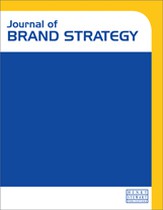Authenticity attracts authenticity: The impact of brand authenticity and self-authenticity on brand loyalty
Abstract
Consumers today seek authenticity, making brand authenticity an important component in marketing strategy. Despite the importance of brand authenticity, there is still very little research on how to effectively build it and what behavioural outcomes such an impact might produce. Building on prior work, this study demonstrates that consumers’ self-authenticity is an important driver of their perceptions of brand authenticity and in turn brand loyalty. Two field studies in the retail sector were conducted, each with a different brand and different consumer segment. The data revealed that greater self-authenticity was associated with greater brand loyalty. Similarly, brand authenticity was positively associated with brand loyalty. In fact, findings show that the impact of self-authenticity on brand loyalty is mediated by brand authenticity. In other words, self-authentic consumers tend to perceive greater brand authenticity and, in turn, exhibit greater loyalty towards the brand — a finding that both enhances the external validity of previous research and extends it in important new ways. Specific ways for managers to target self-authentic consumers are discussed.
The full article is available to subscribers to the journal.
Author's Biography
Ryall Carroll , PhD, has been at St. John’s University since the Fall of 2008, after completing his PhD in marketing at the City University of New York — Baruch College. His research focuses on consumer behaviour, including psycholinguistics, sociolinguistics and behavioural decision theory. His work has been published in top academic journals, including the Journal of Advertising and Marketing Letters, as well as in books such as Psycholinguistic Phenomena in Marketing Communications. Dr Carroll has presented his research at prominent academic conferences, including The Association for Consumer Research and Society for Consumer Psychology. He has taught marketing at the graduate, undergraduate and executive-level across four continents — the US, Europe, Asia and Africa. In addition, Dr Carroll has received recognition from the college through the Outstanding Service Award 2014–2015, Teaching Excellence Award 2012–2013 and Best Practice-Based Research Publication 2011–2012 and 2018–2019.
Fabienne T. Cadet is an Assistant Professor of Marketing at Nova Southeastern University. She completed her PhD in marketing at Hampton University. Her research is motivated by her interests in consumer behaviour, services marketing and branding. Dr Cadet's research has been published in top journals such as the Journal of Business Research and the Thunderbird International Business Review. She was also awarded the Best Practitioner Award Finalist at the 26th Annual Frontiers in Service Conference. Prior to her role as a full-time professor, she was both an adjunct professor and industry professional, holding various roles such as senior marketing manager and senior market analyst.
Luke Kachersky , PhD, is Assistant Professor of Marketing at the Gabelli School of Business of Fordham University in New York. His research focuses on consumer behaviour, including consumer well-being and the role of self-concept in response to brand names. In addition to his research and teaching responsibilities, Dr. Kachersky is the Research Director of The Center for Positive Marketing and the Coordinator of the Gabelli School’s undergraduate thesis programmes.
